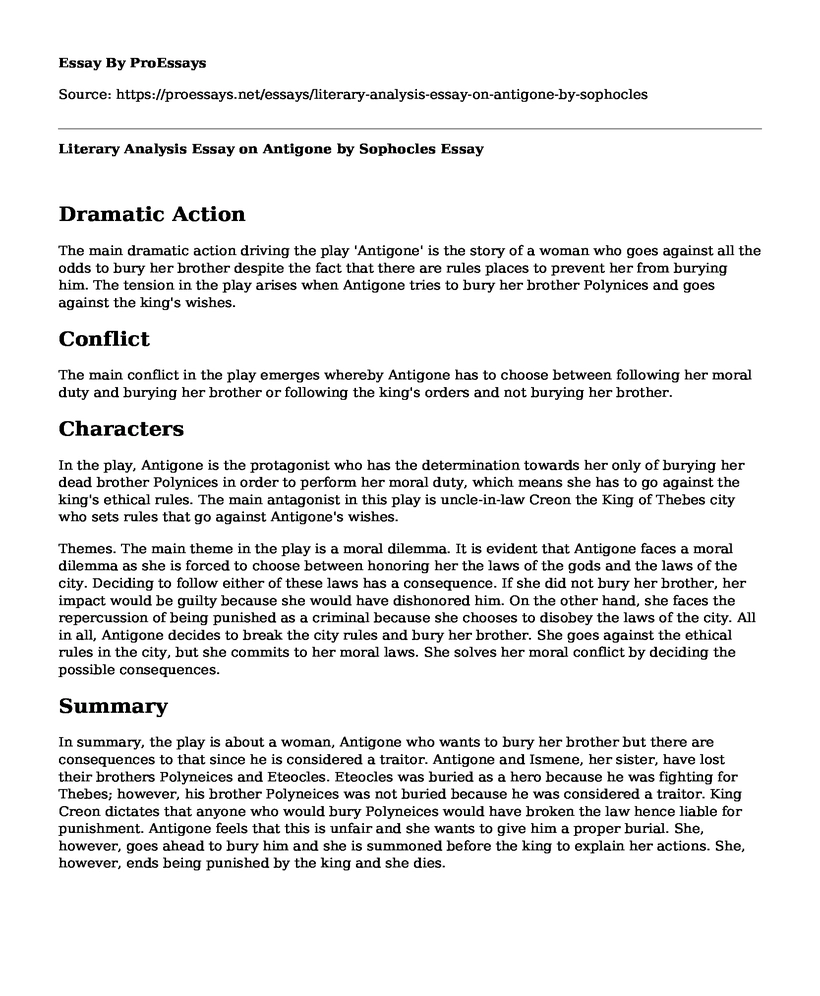Dramatic Action
The main dramatic action driving the play 'Antigone' is the story of a woman who goes against all the odds to bury her brother despite the fact that there are rules places to prevent her from burying him. The tension in the play arises when Antigone tries to bury her brother Polynices and goes against the king's wishes.
Conflict
The main conflict in the play emerges whereby Antigone has to choose between following her moral duty and burying her brother or following the king's orders and not burying her brother.
Characters
In the play, Antigone is the protagonist who has the determination towards her only of burying her dead brother Polynices in order to perform her moral duty, which means she has to go against the king's ethical rules. The main antagonist in this play is uncle-in-law Creon the King of Thebes city who sets rules that go against Antigone's wishes.
Themes. The main theme in the play is a moral dilemma. It is evident that Antigone faces a moral dilemma as she is forced to choose between honoring her the laws of the gods and the laws of the city. Deciding to follow either of these laws has a consequence. If she did not bury her brother, her impact would be guilty because she would have dishonored him. On the other hand, she faces the repercussion of being punished as a criminal because she chooses to disobey the laws of the city. All in all, Antigone decides to break the city rules and bury her brother. She goes against the ethical rules in the city, but she commits to her moral laws. She solves her moral conflict by deciding the possible consequences.
Summary
In summary, the play is about a woman, Antigone who wants to bury her brother but there are consequences to that since he is considered a traitor. Antigone and Ismene, her sister, have lost their brothers Polyneices and Eteocles. Eteocles was buried as a hero because he was fighting for Thebes; however, his brother Polyneices was not buried because he was considered a traitor. King Creon dictates that anyone who would bury Polyneices would have broken the law hence liable for punishment. Antigone feels that this is unfair and she wants to give him a proper burial. She, however, goes ahead to bury him and she is summoned before the king to explain her actions. She, however, ends being punished by the king and she dies.
Environmental factors
In terms of environmental facts, the play is set before or in 441 BC in the city of Thebes which had been through a war.
Dialogue
The dialogue that interests me in the play is Antigone's words to her sister. She says, "I will bury him". This dialogue caught my attention because it shows Antigone's determination and fearlessness to go against the king and bury her brother.
If you could change the ending of the play, what would you change and why?
I would change this ending by making sure that King Creon acknowledged the moral conflict faced by Antigone by letting her bury her brother without punishing her. This way he would be applauded as a king who understands people's and moral dedications.
How would you stage the play? Would you change the setting? Time period?
In staging the play I would not change the setting of the play; however, I would change the time setting to a more modern early age period in order to make sure that the audience relates to the play.
Cite this page
Literary Analysis Essay on Antigone by Sophocles. (2022, Nov 04). Retrieved from https://proessays.net/essays/literary-analysis-essay-on-antigone-by-sophocles
If you are the original author of this essay and no longer wish to have it published on the ProEssays website, please click below to request its removal:
- American Dream and Happiness from the Perspective of Different Characters in Death of a Salesman - Critical Essay
- Literary Analysis Essay on A Rose for Emily by William Faulkner
- Literary Analysis Essay on Hills Like White Elephants by Ernest Hemingway
- Literary Analysis Essay on "Salvage" by Orson Scott Card
- Poetry Analysis Essay on Mary Oliver's Crossing The Swamp
- Essay Example on Here Come the Sun: Struggles of Life in Jamaica's River Bank
- Essay on Insights and Epiphanies: Understanding the Narrator's Transformation in 'Cathedral'







